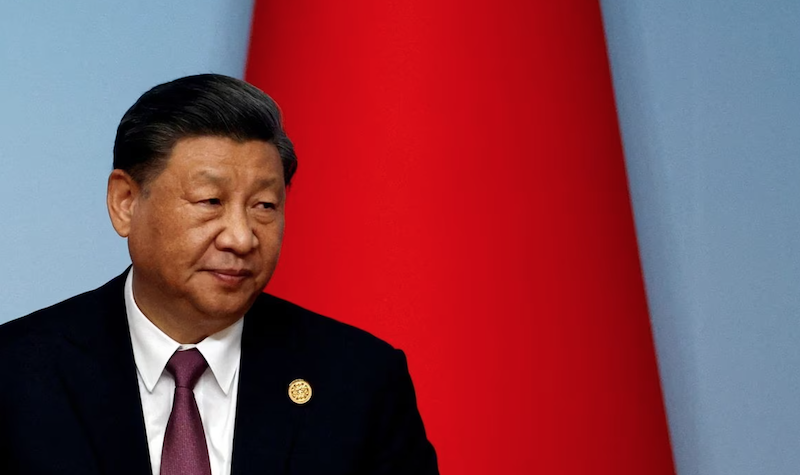China is set to step up its hold over the $61 trillion financial sector, amidst a regulatory crackdown that has seen detentions of several top executives and an unrelenting crusade against corruption in the industry.
This week, at a twice-a-decade financial policy meeting, Beijing vowed to uphold the centralised and unified leadership of the Communist Party (CCP) on the country’s financial work. Chinese President Xi Jinping and Premier Li Qiang were in attendance at the meeting.
China will “persist in taking risk prevention and control as the eternal theme of financial work,” the Central Financial Work Conference held in Beijing was quoted as saying.
Also on AF: China Removes Top Bloggers’ Anonymity, Sparking Privacy Fears
“We should be aware that all kinds of contradictions and problems in the financial field are intertwined and influence each other, some of which are still very prominent, and there are still many hidden risks of economic and financial risks.”
First held in 1997, the meeting – previously known as the national finance work conference – is closely watched for its impact on the development of China’s financial system, setting the direction for major reforms over the next five years.
The conference, usually held once every five years, did not take place in 2022. The last one was in 2017.
Real estate debt, LGFVs in focus
With Chinese leaders trying to revive the economy and fend off potential financial risks, a key focus of the meeting was local government debt, which has ballooned to a daunting $13 trillion in the wake of a persistent real estate crisis.
A recent report by credit agency S&P Global Ratings said regional Chinese banks have a $300-billion exposure to local government financing vehicles (LGFVs).
The policy meeting held on Monday and Tuesday said China would set up a mechanism for resolving local debt risks and managing local government debt.
It will also help with reasonable financing demands for all types of property enterprises and pursue policies that aim to meet housing demand, the conference was quoted as saying.
View this post on Instagram
Preventing systemic risks
China will also maintain a prudent monetary policy, enrich its monetary policy toolkit, allocate more financial resources to promote technological innovation, advanced manufacturing, green development and small firms, and keep the yuan exchange rate at a reasonable and balanced level, the gathering said.
Additionally, it said China will strengthen its capital market hubs, develop diversified equity financing and improve the quality of listed companies.
“The property sector slowdown and the LGFV debt problem lead to rising risks in the financial system,” said Zhiwei Zhang, chief economist at Pinpoint Asset Management.
“The government will likely tighten financial regulation in the next five years to prevent systemic crisis.”
‘All financial activities under supervision’
In March, China unveiled a sweeping shake-up of its financial regulatory regime, including a plan to set up the Central Financial Commission to tighten the party’s grip on the financial sector.
China will improve the mechanism of the party’s leadership in financial work, with the Central Financial Commission playing its role, the conference was quoted as saying.
China will also guard against systemic risks and put all kinds of financial activities under supervision, it said.
China’s tightening grip on its financial sector is in line with president Xi’s increasing focus on national security risks within the economy and critical industries.
Over the past year, China’s main anti-graft agency and the CCP’s decision-making body have both vowed to crack down on corruption within the industry. That has led to arrests of a wide range of executives including top dealmaker Bao Fan, former Bank of China chairman Liu Liange and former AMC fund manager Wang Yawei.
The crackdown has also focused on the opulent lifestyles led by finance industry executives, leading to wide-ranging pay cuts and warnings to banking and investment sector employees against activities that might attract regulatory scrutiny, such as posting pictures of expensive meals, clothes or bags on social media.
- Reuters, with additional inputs from Vishakha Saxena
Also read:
China Hits 12 Regions, Cities With New Debt Growth Curbs
China Asks Banks to Roll Over $13tn Local Debt at Lower Rates
China’s Central Bank Chief Pledges ‘Forceful’ Economic Support
China Bans Top Nomura Investment Banker From Exiting Mainland
China Gets New Finance, Science Ministers, Defence Chief Axed
China’s Property Sector Will Remain Weak For Years: Goldman
China Imposing Foreign Travel Limits on Bankers, State Workers
Country Garden Defaults on Bond, Sparks Contagion Fears – FT
























